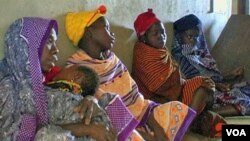LONDON —
Women are responsible for up to 80 percent of all food production in Africa, but they bear a disproportionately large share of the global burden of disease and death, according to a World Health Organization report launched in London on Friday, coinciding with International Women’s Day.
“The African region is making very slow progress towards improved women's health," said Dr. Luis Gomes Sambo, World Health Organization's director for Africa.
WHO's new report, “Addressing the Challenges of Women’s Health in Africa,” surveys a range of statistical information about women’s health in Africa, and the picture it paints is bleak.
Maternal mortality is a major concern. The region accounts for more than half of all maternal deaths worldwide. In sub-Saharan Africa a woman’s lifetime chance of dying as a result of childbirth is 1 in 42. Compare that to Europe, where the rate is about 1 in 2,900.
Women in Africa contract cervical cancer at the highest rate in the world - double the global average.
And every year around two million girls between the ages of four and 12 are subjected to female genital mutilation.
The World Health Organization says the question of how to improve women’s health in Africa must be re-examined completely - and at the heart of that should be a fundamental boost in the status of women in society.
Sociocultural factors are key, says Sambo.
“There are other dimensions that need to be addressed, like women's empowerment and also improving literacy, improving the economic status, addressing some cultural challenges that could overall improve the well-being of women," he said.
The report says more resources should be targeted toward health concerns.
In April 2001, African Union countries met in Nigeria's capital, Abuja. Delegates pledged to increase their governments' funding for health programs to at least 15 percent of their national budgets.
Since 2003, however, average health spending by African countries has hovered at around just 10 percent. Thirteen African countries spend less on health programs now than they did in 2001.
WHO says donor spending varies dramatically from state to state - from as much as $115 to less than $5 per person per year.
What’s more, says Sambo, women’s health is often a low priority in a region with wide-ranging health concerns.
“Africa is also affected by other public health priority problems like HIV/AIDS, malaria, tuberculosis, child health," he said. "Maternal health is a priority that has not been sufficiently addressed, both at national and international levels.”
The report says African women account for more than half of female deaths worldwide due to communicable and noncommunicable diseases, maternal and perinatal conditions and nutritional deficiencies.
“The African region is making very slow progress towards improved women's health," said Dr. Luis Gomes Sambo, World Health Organization's director for Africa.
WHO's new report, “Addressing the Challenges of Women’s Health in Africa,” surveys a range of statistical information about women’s health in Africa, and the picture it paints is bleak.
Maternal mortality is a major concern. The region accounts for more than half of all maternal deaths worldwide. In sub-Saharan Africa a woman’s lifetime chance of dying as a result of childbirth is 1 in 42. Compare that to Europe, where the rate is about 1 in 2,900.
Women in Africa contract cervical cancer at the highest rate in the world - double the global average.
And every year around two million girls between the ages of four and 12 are subjected to female genital mutilation.
The World Health Organization says the question of how to improve women’s health in Africa must be re-examined completely - and at the heart of that should be a fundamental boost in the status of women in society.
Sociocultural factors are key, says Sambo.
“There are other dimensions that need to be addressed, like women's empowerment and also improving literacy, improving the economic status, addressing some cultural challenges that could overall improve the well-being of women," he said.
The report says more resources should be targeted toward health concerns.
In April 2001, African Union countries met in Nigeria's capital, Abuja. Delegates pledged to increase their governments' funding for health programs to at least 15 percent of their national budgets.
Since 2003, however, average health spending by African countries has hovered at around just 10 percent. Thirteen African countries spend less on health programs now than they did in 2001.
WHO says donor spending varies dramatically from state to state - from as much as $115 to less than $5 per person per year.
What’s more, says Sambo, women’s health is often a low priority in a region with wide-ranging health concerns.
“Africa is also affected by other public health priority problems like HIV/AIDS, malaria, tuberculosis, child health," he said. "Maternal health is a priority that has not been sufficiently addressed, both at national and international levels.”
The report says African women account for more than half of female deaths worldwide due to communicable and noncommunicable diseases, maternal and perinatal conditions and nutritional deficiencies.
